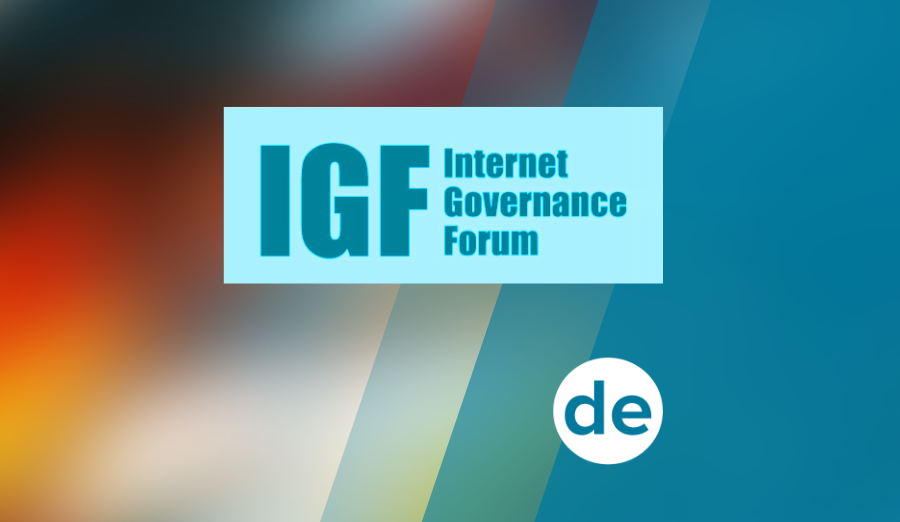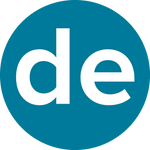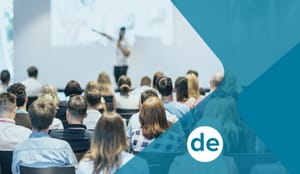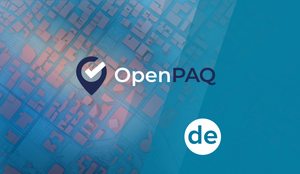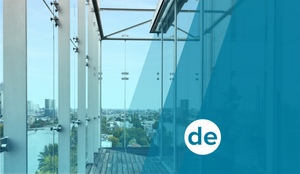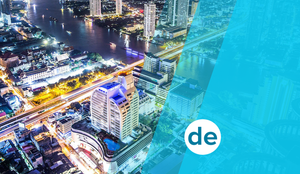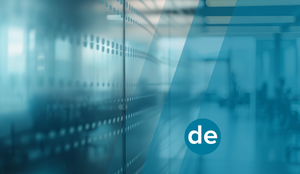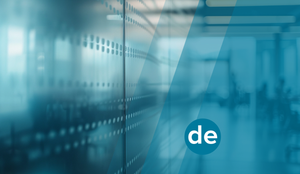To be integrative means to live openness - to be neutral means to value freedom - to be strong through the cooperation of many means to promote security: By being a domain registry organised in a unique way worldwide - as a not-for profit Cooperative - DENIC eG embodies a lot that is fundamental to the concept of Internet Governance. Therefore, its long-standing and far-reaching commitment to preserving and enhancing the global, open, free and secure Internet is simply consistent.
Advocating diversity of opinion and freedom of participation in the network of networks
We strive to preserve the Internet as a forum for many and a space for global exchange, as a platform for innovation, creativity and business ideas that works across traditional borders. To this end, DENIC builds on strong alliances and is closely networked within a multitude of contexts on a national and international level. This enables the Cooperative to remain constantly involved in shaping the Internet of the presence and the future, in accordance with the interests of the German Internet community. Close coordination and cooperation to build consensus for developing highest-quality standards is our prime goal.
Internet Governance: Part of DENIC’s key set of values
DENIC does not only view its core task – i. e. ensuring Internet users’ fast, secure and reliable access to webpages and services under Germany’s country code TLD .de - as a social mission. The Cooperative also actively promotes the multistakeholder model in the context of Internet Governance and has been constantly involved in a multitude of IG organisations for many years: Multistakeholderism is a pluralistic approach that unites different stakeholders - from representatives of governments and international organisations to the private sector, academia and civil society to the technical infrastructure operators of the Internet (like DENIC itself). All these stakeholders join together to develop rules, values and standards related to the Internet of the presence and the future on an equal footing. And all of this is achieved bottom up instead of top down.
DENIC - the NETworkers
Take, for instance, ICANN (Internet Corporation for Assigned Names and Numbers): This independent organisation coordinates the unique identifiers (names and numbers) on which the Internet's underlying addressing system to access services like websites or e-mail applications is based. Important decisions concerning the Internet’s architecture or actions taken at ICANN level to enhance the security and stability of the Internet have a direct impact for DENIC as an infrastructure operator running Germany’s country code TLD .de. Therefore, DENIC representatives are regularly involved in the coordination processes of all stakeholder groups in the context of ICANN policy-making within the scope of committees and working groups. In addition, in autumn 2020 DENIC will be one of the hosts of the ICANN69 Meeting in Hamburg, where several thousands of attendees will make decisions on important core functions of the Internet.
Another example is the Internet Governance Forum (IGF): DENIC representatives have participated in this annual discussion forum of the United Nations, which addresses current legal, political, social and technical aspects of the Internet, since it was launched in 2006. At the 14th IGF Annual Meeting that will be held for the first time in Germany from 25 to 29 November 2019, DENIC will actively contribute by engaging in plenary dialogue and by hosting its own information booth, where visitors will be able to find out about DENIC’s wide-ranging Internet Governance activities. Moreover DENIC CEO Dr Jörg Schweiger will discuss at a podium made up of prominent experts including Internet pioneer Vint Cerf under the title ‘NETmundial+5: The Legacy and Implications for Future Internet Governance‘ diskutieren (Pre-Event 32: Day 0, 25 November 2019, 13:05 to 15:05 CET, Room V).Priority themes of the 14th IGF Annual Meeting will be ranging from technical, legal and organisational aspects of dealing with and exchanging data (Data Governance) through matters related to access to and participation in digitisation and its shaping on an equal footing (Digital Inclusion) to the protection of people, resources and infrastructures in the digital age (Security & Safety, Stability & Resilience).
On a European level, DENIC has supported the annual European Dialogue on Internet Governance (EuroDIG)since its foundation in 2008 as a sponsor, which deals with specific problems and interests of the European Internet community regarding the development of collective Internet Governance strategies.
Also DENIC has been deeply involved in the German Chapter of the Internet Governance Forum (IGF-D) as a co-sponsor and technical community member of the advisory board, right from the start. We regularly participate in the organisation and contribute to the program of the public Annual IGF-D Meeting, where matters of current societal relevance for Digital Germany are discussed - from platform economy to 5G rollout or AI regulation.
For many years, DENIC has intensely fostered the exchange of know-how, expertise and best practices in various cooperations and working groups within the framework of the Council of European National Top-Level Domain Registries, CENTR. Collaborative projects in the range of security as well as research and development largely contribute to strengthening digital infrastructures and the stability of the Internet.
Encouraging digital participation and diversity
With its web-based Internet Governance Radar DENIC provides a one-stop source of information offering a concise overview of the current dialogues on Internet Governance issues: Kept regularly up-to-date, the first comprehensive online information platform available both in German and English provides basic knowledge as well as in-depth background information on players, topics and developments within the Internet Governance ecosystem to a wide audience.
In line with the principle of diversity rooted in the multistakeholder model DENIC in 2007 was one of the co-founders of the European Summer School on Internet Governance (EuroSSIG) aimed at promoting next-generation Internet Governance leaders and has been its main sponsor ever since. More than 350 fellows from more than 80 countries have attended the academy so far, having acquired a broad knowledge of the political, legal, sociocultural and technical aspects of Internet Governance, which has enabled them to collaborate in qualified discussions within the sphere of international Internet Governance organisations.
For a long time, only language scripts based on the Latin character set predominantly in use in Western European and American languages could be used in the Domain Name System, which forms the technological basis to allow access to web-based services including webpages or e-mail applications. With a source code donation to the Mozilla Foundation in 2016 DENIC has enabled users from all over the world to utilise thousands of additional characters of their language scripts. Mozilla's web browser Firefox and e-mail client Thunderbird since then support all special characters (Internationalized Domain Names, IDNs) that are defined in the IDNA 2008 standard, by recognizing them as valid characters and displaying them correctly. This means that for example Greek-, Farsi- or Sinhala-speaking Internet users benefit from the DENIC-donated code and can now employ special characters of their languages without restrictions when using the aforementioned Mozilla programs on the Internet. Through this innovation the Internet becomes more diverse and colourful, allowing people from other cultural environments, whose particular language scripts form part of their own specific cultural identity, to participate in digitisation for the first time ever in their native languages.
Promoting Internet security
By cooperating with public authorities, academia and various coordination and standardisation bodies DENIC contributes to the future-proof enhancement of digital infrastructures on a national and international level to ensure more security online.
These include inter alia the Internet Engineering Task Force (IETF), which is responsible for technical Internet standards, as well as Germany’s national CERT Association, an alliance of more than 40 computer emergency response teams within large private companies, research institutes and public institutions operating at national and federal state level.
The Cooperative also actively participates in the forum of European operators of IP networks and network infrastructure, RIPE NCC, where upon DENIC’s initiative a working group was established that deals with the risks and opportunities of the Internet of Things and with how they can be controlled by applying uniform international security standards. Most recently DENIC shared an open source software tool with the Internet community via the open platform for DNS developers and operators DNS-OARC, which can be used to meter the performance of DNS servers. This parameter is then used to evaluate the efficiency of Internet infrastructures.
As a member of the Information Technology and Selected IT Applications Standards Committee at the German Institute for Standardization (DIN), DENIC is involved in the development of a data privacy and privacy management standard. It shall ensure that international IT security and data privacy standards are applied uniformly all over Europe, resulting in an equal security standard everywhere.
The name service for the country code TLD .de provided by DENIC is part of the critical infrastructure for the operation of the German Internet and is therefore of particular importance for public utility and safety, in Germany. In the framework of a public-private partnership called KRITIS, DENIC cooperates with other critical infrastructure operators, their related associations and the responsible government authorities to ensure the provision of critical infrastructure services in Germany at all times and to safeguard them against risks and threats through the best possible organisational and technical measures.
Moreover, DENIC cooperates with the national CISPA Helmholtz Center for Information Security to combine research with practical experience in the fields of cyber security and data protection in the framework of various projects. The focus of the jointly developed concepts, optimisation and defence strategies is to directly implement new research findings into DENIC’s provided technical services to mitigate possible attacks against DENIC’s infrastructure that could compromise availability of the German Internet.
In recent years people have developed a growing sensitivity towards data privacy issues. Therefore DENIC has co-developed in cooperation with leading hosting and open source software players, a low-threshold, privacy-friendly alternative to social media logins within the framework of the ID4me initiative. The global, open, federated and secure Single Sign-On solution ID4me uses domains and the Domain Name System (DNS) as a basis for digital identity management on the Internet grounded in the principle of distributed responsibilities. An ID4me login provides easy and convenient access to all of a user's online accounts, enabling them to log in via a single defined set of credentials to a multitude of services. Other than with social media logins, each owner of an ID4me account will determine with whom they will share which data and for how long. As a result, ID4me users will have full control over their personal data at all times. Also, the basic principle of distributed responsibilities ensures that the overall data necessary for the authentication process is stored at neither of the involved technical players alone, but each of them possesses only those information they need to know to perform their specific tasks, in accordance with their defined role.
An important shaping force for the Internet landscape of tomorrow
With the rise of the Internet’s relevance in all social spheres, active participation in digital governance decision-making becomes ever more important for an operator of infrastructure services like DENIC, who is responsible for a basic resource on the Internet with the country code TLD .de. Therefore, we will continue pursuing and further broaden our commitment in the context of Internet Governance in the future.


